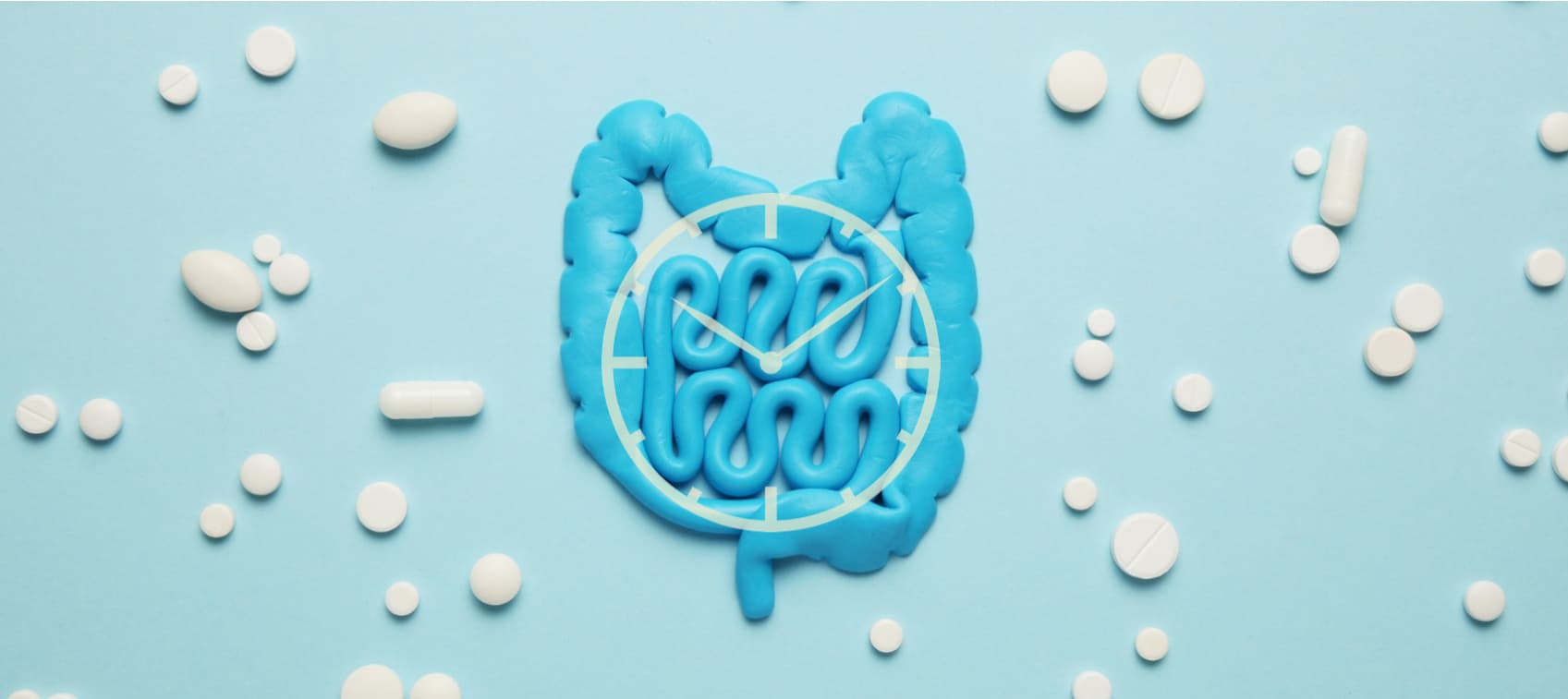
We are living in an era where health and safety precautions are amplified. The fear of spreading or catching some sort of bacteria or infection has caused the stock of sanitizing agents to skyrocket.
Of course, this is not without merit.
Sanitation practices and good hygiene should always be a top priority. But there still lies a common misconception that all forms of bacteria are bad and deserve to be drowned in a sea of sanitizer.
Probiotics beg to differ. The health benefits of these bacteria speak for themselves — not all bacteria are bad. That debate is over. However, one debate continues to rage on: When is the best time of the day to take probiotics?
That is a question worth considering.
Gut Health and Probiotics
Before we dive into the question of timing, it is important to understand what probiotics are and the beneficial role of good gut bacteria for overall health.
Gut Health Is Important, Too
The information and literature for heart and brain health are endless, for a good reason. But in our quest for health and wellness, we should not overlook the importance of digestive (gut) health.
In our day, refined carbohydrates, sugars, processed foods, and lifestyles have wreaked havoc on our digestive systems and gut health — the gut microbiome, in particular.
These microbes are made up of countless amounts of bacteria. They play a pivotal role in digestion and the elimination of waste.
Scientists tell us that this community of microbes contributes to many functions in the body that include:
- Digestion and assimilation of various nutrients
- Synthesis of important vitamins; B12, folate, and K
- Promotes healthy immune function; protecting against bad bacteria
- Supports the metabolism of medication
- Helps break down certain carbohydrates into fatty acids
What are probiotics?
Probiotics are live microorganisms — good bacteria — that our bodies need for overall health; they help things stay balanced. They are usually associated with gut health but their role affects the entire body. In fact, our entire body is filled with microbes.
What is the role of probiotics?
Good gut bacteria support health in numerous ways. But one of the key roles has to do with balance. The truth is, we need good bacteria to fight off bad bacteria.
Bad bacteria must be controlled. Otherwise, it will run rampant in the body, causing all sorts of health issues, including serious infections.
Probiotics help maintain and support this bacterial balance.
Bacterial imbalance in the digestive system
Balance is ideal, but the imbalance is too often the case. In many cases, this bacterial imbalance begins with our diet and in our colon. The colon is densely populated by gut microbes and it has a direct role in the proliferation of bacteria.
The standard diet of our day is littered with excess refined sugars and carbohydrates, processed foods, and even toxins. This, coupled with the absence of fiber in our diets, makes the colon a ripe environment for pathogenic bacteria to grow and flourish.
Other Factors That Contribute to the Imbalance
There are other factors that impact the balance of gut bacteria. The consumption of chlorinated water and exposure to environmental pollutants are some.
Also, the excess use of antibiotics contributes to imbalances within the gut microbiome. Antibiotics do their job well, sometimes too well. Antibiotics don’t target specific bacteria. They target all bacteria — both good and bad.
Probiotics and bacterial balance
Simply put, probiotics work to restore and maintain the balance of gut bacteria; by reducing the bad and by replenishing the good.
There are two primary ways in which to get probiotics:
- Probiotic supplements
- Fermented foods
Types and Strains of Probiotics
We don’t have time to get into the depths of every strain of probiotics, but we will focus on the two most common types found in foods and probiotic supplements.
Lactobacillus, the “L” strains
Perhaps the most predominant and most important species of bacteria is Lactobacillus, which resides in the small intestines. This species is largely responsible for producing lactase, an enzyme used to break down lactose (dairy).
The L-strain probiotics are also pivotal for producing lactic acid.
Lactic acid helps create an acidic environment within the digestive tract. This helps encourage mineral absorption of calcium, magnesium, and iron. It also discourages alkaline-dependent microorganisms. Research has also found a link between probiotic lactobacillus intake and emotional behavior.
The L-strain probiotics can be found in fermented foods and probiotic supplements.
Bifidobacterium, the “B” strains
The B-strain of probiotics reside in and line the wall of the large intestines and colon.
B-strains protect against harmful bacteria and microorganisms like yeast. They also support lactic acid production — helping provide a protective layer along the intestinal walls and promoting proper pH balance within the gut.
They also help absorb certain vitamins and even aid in the production of B-complex vitamins. As a probiotic, they have improved IBS symptoms like bloating, urgency, and abdominal discomfort.
The B-strain probiotics can also be found in fermented foods and probiotic supplements.
Best Time of the Day to Take Probiotics
Now to the question at hand, when is the best time of day to take probiotics supplements?
It may not surprise you that this question has been and still is debated among nutritional scientists and researchers. The debate over timing in the medical community applies to the time of the day and timing regarding food — before, after, or during meals.
Some proponents are ardent about the belief that probiotics should be taken on an empty stomach so as not to degrade the probiotics through harsh stomach acids and ensure probiotic viability.
Here are examples of the different recommended probiotic advice out there:
- Take probiotics right before you begin your meal or with your meal
- Avoid taking probiotics with a meal
- Take probiotics 20 – 30 minutes after you eat
- Take probiotics 20 – 30 minutes before you eat
- Take probiotics first thing in the morning on an empty stomach
- Take probiotics at bedtime
- Take probiotics whenever it’s convenient for you
- Take probiotics with fats
Research Suggests Taking Probiotics Before a Meal
One research study on the impact of meals on probiotics may help shed some light on this debate. The research objective was to examine the impact of the time of administration of probiotics with mealtimes; measuring the survivability of the bacteria when taken before and after meals.
In short, researchers concluded that probiotics survivability was best preserved when taken 30 minutes before a meal or with a meal.
Probiotics taken 30 minutes after a meal did not survive at the same rate. Furthermore, researchers concluded that the fat content of the meal did contribute to survivability.
The Bottom Line on Probiotics
Probiotics have one objective; overall health. There is no need to lose sleep or let the debate surrounding their timing complicate your life. A healthy gut is the goal.
But does timing matter? Yes.
Taking probiotics with a meal or 30 minutes prior is ideal. But consistency is the key. Establishing a routine is the name of the game in probiotics and it will make your life a lot easier. So, before we close, here is some final advice on maintaining gut health.
Avoid sugary foods and drinks, they aren’t a friend to your gut.
Not only do processed sugars and carbs contribute to inflammation within the body, but they throw your metabolic system out of whack. On the other hand, fermented foods like yogurt, kefir, and sauerkraut are great sources to help support a healthy gut microbiome.
Choose whole, organic foods whenever you can, those rich in fiber. Throw in some fermented foods at least once a day. Your gut will thank you.
We’ve discussed some of the benefits of probiotic supplements. There are options available, many of which are loaded with the top bacteria strains (the good kind). Probiotic Advantage contains a probiotic blend of the top L-strains and B-strains to keep the bacterial balance in check.
Frequent exercise not only reduces stress but has also been shown to improve the gut microbiome. When the blood gets flowing during exercise, it gets flowing everywhere, including your gut.
Now, onward you go to better gut health.


